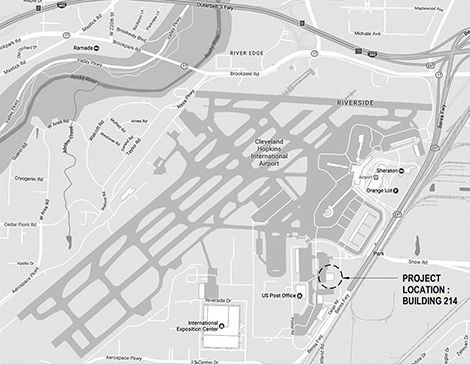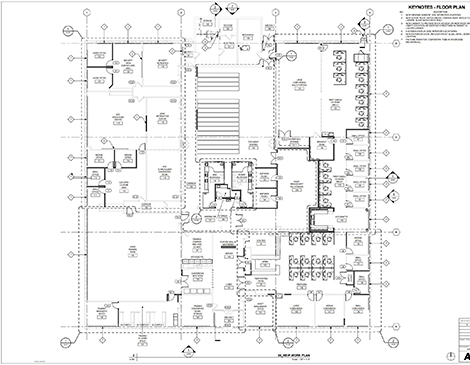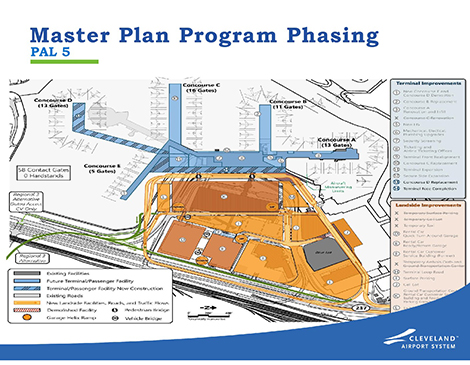Hopkins Airport Launches $3B Modernization with Office Renovation
by Ken Prendergast, NEOTrans | Oct. 14, 2024 | 9:00 AM

Ken Prendergast, NEOTrans
This article was published through an exclusive partnership with NEO-trans.com.
No, we’re not talking about the closed, aging Airport Sheraton Hotel getting demolished this week. We’re talking about renovations and renewal, although the hotel’s demolition is part of the grand plans for updating Hopkins as one of the city’s principal gateways and first impressions.
Instead, we’re talking about the building at 5900 Cargo Rd. It is just far enough away from the major reconstruction work on Hopkins’ passenger terminal so that, after its own renovation, it won’t be directly affected by Hopkins’ Terminal Modernization Development Program (TMDP) to follow. The TMDP is basically a two-decade, two-dimensional, sliding block puzzle that’s about to get underway on the large but finite space.
Key elements of the TMDP will include expanded and updated airport ticketing and passenger gate areas, consolidated and expanded security checkpoint processing, improvements to the roadway access system, increased public parking capacity and enhanced customer experience throughout airport facilities. But first, planners need a place at the airport to oversee the work.

“Renovations to (an) existing building to create office and storage space for airport staff and consultants” are going to get underway to the city-owned Building 214 on Cargo Road, said Civil Infrastructure Program Manager Greg Cifra and Architect Keith William Hayes in filing plans with the city on Oct. 4. Both men work for Cleveland’s airport masterplan consultant AECOM.
Funding for the work is coming from $175 million for the first phase of the TMDP, provided by financial support from the airlines. It will focus on “program definition” efforts which will look to refine the future airport facility requirements, establishing recommendations for renovation versus replacement of existing infrastructure and cost estimates of project elements.
Cifra opened but otherwise didn’t respond to an e-mail from NEOtrans seeking more information about the outcome of the work, including how many people will work in the renovated building. Per fire codes, nearly 400 people could legally occupy the building. More than 100 parking spaces are within 100 feet of the building with many more nearby.
The floor plans show offices, cubicles, workstations and other spaces that suggest about 50 employees could be working in the building, although many more workers and visitors could simultaneously occupy its planned operations center, document/map filing rooms, joint information center, seven conference facilities and large training room.

Dallas-based AECOM is a global engineering firm which specializes in major public works projects. It has mapped out the preliminary phasing of Hopkins’ forthcoming, multi-phase TMDP in a city-approved masterplan. At the end of last year, the city’s Department of Port Control which manages Hopkins and Burke Lakefront Airport hired Paslay Group of Fort Worth, TX to provide executive program management services. It will deliver the city’s TMDP for Hopkins Airport.
Paslay is partnered with Corgan, a nationally recognized architecture and design firm, and Connico, which specializes in cost estimating, scheduling and phasing for airports across the US. The airport planning team also includes Cleveland-based firms Robert P. Madison International and Van Auken Akins Architects to provide additional design services, much of which will take place at Building 214.
The city will begin early construction-related efforts like Building 214’s renovation in 2025 – the centennial anniversary of Hopkins Airport. The airport opened in 1925 as the first city-owned airport in the United States. The airport was named in 1951 after William Hopkins, Cleveland’s city manager from 1924-29.
“The approval to commence the first phase of the TMDP is the culmination of many months of working together with our signatory airline partners and our combined commitment to deliver world-class facilities which our customers desire and deserve,” said Department of Port Control Director Bryant Francis in a written statement.
He said the TMDP will represent one of the largest infrastructure projects undertaken in the region, with airport construction and increased operations generating long-term economic benefits, jobs and air service to the residents and visitors to Northeast Ohio. The last major upgrade to Hopkins was more than 25 years ago when a new parallel runway was built.

Demolition of the Sheraton Hotel is an important step forward. It will be cleared and its city-owned land used in the interim for parking. The hotel opened in 1959 and closed in 2022 due to declining structural conditions. Even if its condition hadn’t deteriorated in recent years, the structure was in the way of the department’s bullish vision for the airport.
Building 214 was previously leased by the city to United Airlines as offices for its operations and maintenance personnel. There are two adjacent airplane hangars which, like Building 214, still bear “United” signs on them and even have outlines of prior signs for Continental Airlines which had one of its hubs at Cleveland until it merged with United in 2010.
Cuyahoga County property records show Building 214 was constructed in 1977. Those records also say the metal-sided and concrete block office building is set on a slab foundation. County records note the structure is in good condition.
For more updates about Cleveland, sign up for our Cleveland Magazine Daily newsletter, delivered to your inbox six times a week.
Cleveland Magazine is also available in print, publishing 12 times a year with immersive features, helpful guides and beautiful photography and design.

Ken Prendergast, NEOTrans
Ken Prendergast is a local professional journalist who loves and cares about Cleveland, its history and its development. He has worked as a journalist for more than three decades for publications such as NEOtrans, Sun Newspapers, Ohio Passenger Rail News, Passenger Transport, and others. He also provided consulting services to transportation agencies, real estate firms, port authorities and nonprofit organizations. He runs NEOtrans Blog covers the Greater Cleveland region’s economic, development, real estate, construction and transportation news since 2011. His content is published on Cleveland Magazine as part of an exclusive sharing agreement.
Trending
-
1
-
2
-
3
-
4
-
5










